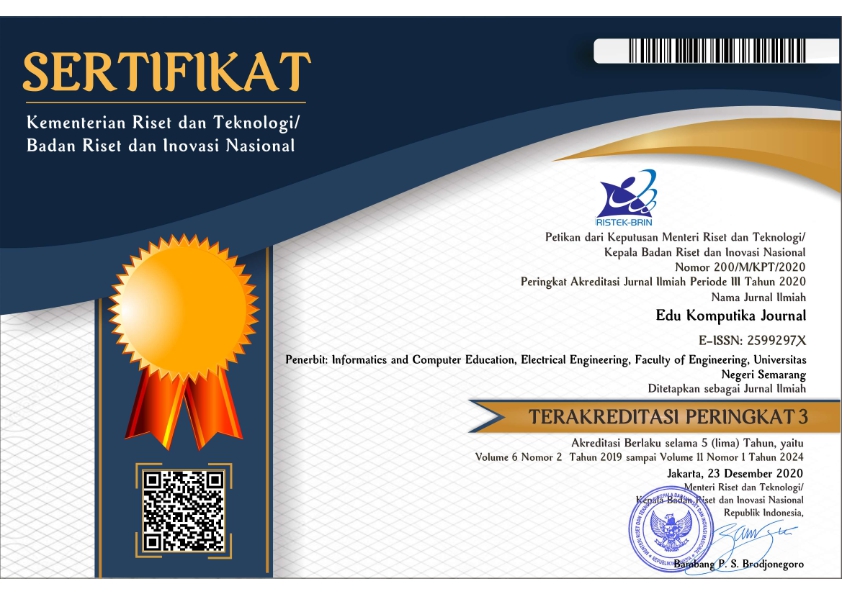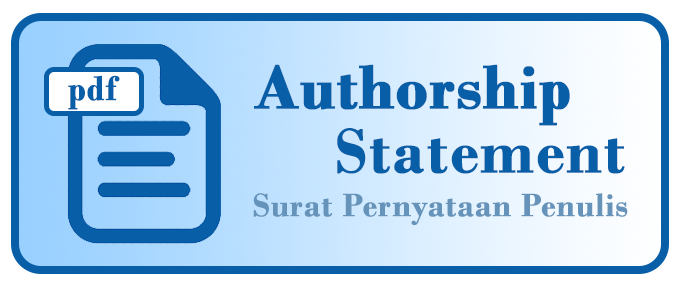Analisis Tren Pertemuan Tatap Muka Terbatas dari Persepsi Warganet pada Twitter Menggunakan Topic Modeling
Abstract
Salah satu dampak dari pandemi COVID-19 adalah pemberlakuan pembelajaran daring. Kegiatan pembelajaran daring banyak mengalami kendala, sehingga menyebabkan tidak tercapainya kompetensi pembelajaran dengan baik. Kemudian pemerintah memberlakukan program Pertemuan Tatap Muka Terbatas (PTMT), dan banyak tanggapan masyarakat terhadap program tersebut. Untuk mengetahui bagaimana persepsi masyarakat terhadap PTMT, kita dapat melakukan analisis terkait PTMT melalui media sosial. Karena media sosial merupakan salah satu media yang paling banyak digunakan oleh masyarakat selama pandemi untuk berkomunikasi, menyampaikan pendapat, mencari berita, dan lain-lain. Adapun analisis tren PTMT dari persepsi warganet yang dapat dilakukan adalah malalui topic modeling. Dengan mengambil data dari Twitter terkait PTMT menggunakan API (Application Programming Interface), selanjutnya memproses topic modeling dengan metode Latent Dirichlet Allocation (LDA), sebuah metode yang paling populer dan banyak digunakan pada penelitian text mining. Hasil pemodelan topik menghasilkan sepuluh klaster topik dengan nilai koheren 0,50344, dengan tiga topik yang paling banyak dibicarakan oleh warganet. Yakni tentang banyaknya tugas yang harus dikerjakan di luar jam sekolah, mereka sudah mencapai titik kebosanan menjalani sekolah dari rumah hingga menyebabkan kemalasan, dan banyak warganet yang membicarakan bahwa mereka akan melaksanakan kegiatan PTMT.
References
Abdullah, W. (2018). Model Blended Learning dalam Meningkatkan Efektifitas Pembelajaran. 7.
Alghamdi, R., & Alfalqi, K. (2015). A Survey of Topic Modeling in Text Mining. International Journal of Advanced Computer Science and Applications, 6(1), 147–153. https://doi.org/10.14569/ijacsa.2015.060121
Andarwulan, T., Al Fajri, T. A., & Damayanti, G. (2021). Elementary teachers’ readiness toward the online learning policy in the new normal era during Covid-19. International Journal of Instruction, 14(3), 771–786. https://doi.org/10.29333/iji.2021.14345a
Antipova, T. (2020). Integrated Science in Digital Age 2020. https://doi.org/doi.org/10.1007/978-3-030-49264-9_32
Asghar, M. Z., Iqbal, A., Seitamaa-Hakkarainen, P., & Barbera, E. (2021). Breaching learners’ social distancing through social media during the covid-19 pandemic. International Journal of Environmental Research and Public Health, 18(21). https://doi.org/10.3390/ijerph182111012
Badiozaman, I. F. A. (2021). Exploring online readiness in the context of the COVID 19 pandemic. Teaching in Higher Education, 0(0), 1–19. https://doi.org/10.1080/13562517.2021.1943654
Basar, A. M. (2021). Problematika Pembelajaran Jarak Jauh Pada Masa Pandemi Covid-19 (Studi Kasus di SMPIT Nurul Fajri – Cikarang Barat – Bekasi ). 2(1), 208–218.
Bastani, K., Namavari, H., & Shaffer, J. (2019). Latent Dirichlet allocation (LDA) for topic modeling of the CFPB consumer complaints. Expert Systems with Applications, 127, 256–271. https://doi.org/10.1016/j.eswa.2019.03.001
Chempaka Seri Abdul Razak, Hamid, S. H. A., Meon, H., Subramaniam, H. A., & Anuar, N. B. (2021). TWO-STEP MODEL FOR EMOTION DETECTION ON TWITTER USERS: A COVID-19 CASE STUDY IN MALAYSIA. Malaysian Journal of Computer Science, 34(4), 374–388.
Dewan Teknologi Informasi dan Komunikasi Nasional. (2020). Akses Digital Meningkat Selama Pandemi. http://www.wantiknas.go.id/id/berita/akses-digital-meningkat-selama-pademi
Direktorat Sekolah Dasar. (2022). Semua Sekolah Wajib Melaksanakan PTM Terbatas pada 2022.
Garbhapu, V. K. (2020). A comparative analysis of Latent Semantic analysis and Latent Dirichlet allocation topic modeling methods using Bible data. Indian Journal of Science and Technology, 13(44), 4474–4482. https://doi.org/10.17485/ijst/v13i44.1479
Hidayatullah, A. F., Aditya, S. K., Karimah, & Gardini, S. T. (2019). Topic modeling of weather and climate condition on twitter using latent dirichlet allocation (LDA). IOP Conference Series: Materials Science and Engineering, 482(1). https://doi.org/10.1088/1757-899X/482/1/012033
Hong, F., Hong, F., Lai, C., Guo, H., Member, S., Shen, E., Yuan, X., & Li, S. (2014). FLDA : Latent Dirichlet Allocation Based Unsteady Flow Analysis FLDA : Latent Dirichlet Allocation Based Unsteady Flow Analysis. December. https://doi.org/10.1109/TVCG.2014.2346416
Jelodar, H., Wang, Y., Yuan, C., Feng, X., Jiang, X., Li, Y., & Zhao, L. (2018). Latent Dirichlet allocation (LDA) and topic modeling: models, applications, a survey. Multimedia Tools and Applications, 78, 183–198.
Kim, H., Cho, I., & Park, M. (2022). Analyzing genderless fashion trends of consumers’ perceptions on social media: using unstructured big data analysis through Latent Dirichlet Allocation-based topic modeling. Fashion and Textiles, 9(1). https://doi.org/10.1186/s40691-021-00281-6
Lazzini, A., Lazzini, S., Balluchi, F., & Mazza, M. (2022). Emotions, moods and hyperreality: social media and the stock market during the first phase of COVID-19 pandemic. Accounting, Auditing and Accountability Journal, 35(1), 199–215. https://doi.org/10.1108/AAAJ-08-2020-4786
Lendriyono, F. (2021). Public’s Perception on Social Media towards New Normal during Covid-19 Pandemic in Indonesia: Content Analysis on Religious Social Media Accounts. IOP Conference Series: Earth and Environmental Science, 717(1). https://doi.org/10.1088/1755-1315/717/1/012039
Lyu, J. C., Han, E. Le, & Luli, G. K. (2021). Covid-19 vaccine-related discussion on twitter: Topic modeling and sentiment analysis. Journal of Medical Internet Research, 23(6). https://doi.org/10.2196/24435
Madzík, P., & Falát, L. (2022). State-of-the-art on analytic hierarchy process in the last 40 years: Literature review based on Latent Dirichlet Allocation topic modelling. In Plos One (Vol. 17, Issue 5). https://doi.org/10.1371/journal.pone.0268777
Meg. (2022). Social media listening guide. https://www.talkwalker.com/blog/social-media-listening-guide
Myat Noe Win, Sri Devi Ravana, and L. S. (2022). SENTIMENT ATTRIBUTION ANALYSIS WITH HIERARCHICAL CLASSIFICATION AND AUTOMATIC ASPECT CATEGORIZATION ON ONLINE USER REVIEWS. Malaysian Journal of Computer Science, 35(2), 89–110.
Nurlayli, A., & Nasichuddin, M. A. (2019). Topic Modeling Penelitian Dosen JPTEI UNY pada Google Scholar Menggunakan Latent Dirichlet Allocation. 4(November), 154–161. https://doi.org/10.21831/elinvo.v4i2.
Paliwal, M., & Singh, A. (2021). Teacher readiness for online teaching-learning during COVID −19 outbreak: a study of Indian institutions of higher education. Interactive Technology and Smart Education, 18(3), 403–421. https://doi.org/10.1108/ITSE-07-2020-0118
Pinto, J. C. L., & Chahed, T. (2015). Modeling multi-topic information diffusion in social networks using latent dirichlet allocation and hawkes processes. Proceedings - 10th International Conference on Signal-Image Technology and Internet-Based Systems, SITIS 2014, 339–346. https://doi.org/10.1109/SITIS.2014.24
Saud, M., Mashud, M., & Ida, R. (2020). Usage of social media during the pandemic: Seeking support and awareness about COVID-19 through social media platforms. Journal of Public Affairs, 20(4). https://doi.org/10.1002/pa.2417
Sikirit, D. (2020). The Challenges of Home Learning during the COVID-19 Pandemic | UNICEF Indonesia. https://www.unicef.org/indonesia/education-and-adolescents/coronavirus/stories/learning-home-during-covid-19-pandemic
statistia.com. (2022). Number of social media users worldwide from 2017 to 2027. https://www.statista.com/statistics/278414/number-of-worldwide-social-network-users/
Sutherland, I., Sim, Y., Lee, S. K., Byun, J., & Kiatkawsin, K. (2020). Topic modeling of online accommodation reviews via latent dirichlet allocation. Sustainability (Switzerland), 12(5), 1–15. https://doi.org/10.3390/su12051821
Wang, Y., Xia, M., Guo, W., Xu, F., & Zhao, Y. (2022). Academic performance under COVID-19: The role of online learning readiness and emotional competence. Current Psychology, 0123456789. https://doi.org/10.1007/s12144-022-02699-7
Wong, A., Ho, S., Olusanya, O., Antonini, M. V., & Lyness, D. (2021). The use of social media and online communications in times of pandemic COVID-19. Journal of the Intensive Care Society, 22(3), 255–260. https://doi.org/10.1177/1751143720966280
Yokomoto, D., Makita, K., Suzuki, H., Koike, D., Utsuro, T., Kawada, Y., & Fukuhara, T. (2012). LDA-based topic modeling in labeling blog posts with wikipedia entries. Lecture Notes in Computer Science (Including Subseries Lecture Notes in Artificial Intelligence and Lecture Notes in Bioinformatics), 7234 LNCS, 114–124. https://doi.org/10.1007/978-3-642-29426-6_15
Zoghbi, S., Vulić, I., & Moens, M. F. (2016). Latent Dirichlet allocation for linking user-generated content and e-commerce data. Information Sciences, 367–368, 573–599. https://doi.org/10.1016/j.ins.2016.05.047
















